ACCT20074: Event Hospitality and Tsogo Sun Analysis Report
VerifiedAdded on 2023/01/20
|17
|3794
|64
Report
AI Summary
This report provides a comprehensive analysis of Event Hospitality (EVT) and Tsogo Sun Holdings Ltd (TSH), focusing on the application of the conceptual framework in financial reporting. The report begins with an overview of the history and development of the conceptual framework in the USA, UK, Australia, and globally under the IASB. It then discusses the Australian accounting profession's concerns regarding the application of the IASB/IFRS Conceptual Framework. The analysis extends to a critical discussion of academics' concerns regarding the quality, benefits, and limitations of the conceptual framework. Part A focuses on the conceptual framework, including its history, the accounting profession's perspective, academic concerns, and its application to Event Hospitality. Part B analyzes the sustainability and integrated reporting of Tsogo Sun Holdings Ltd. The report examines the financial positions of Event Hospitality based on the conceptual framework. It explores recognition principles, measurement bases for revenue, assets, and liabilities and the qualitative characteristics of information exhibited in the company's financial reports. The report makes a comparison between the Australian and South African companies and evaluates the financial statements against the conceptual framework.
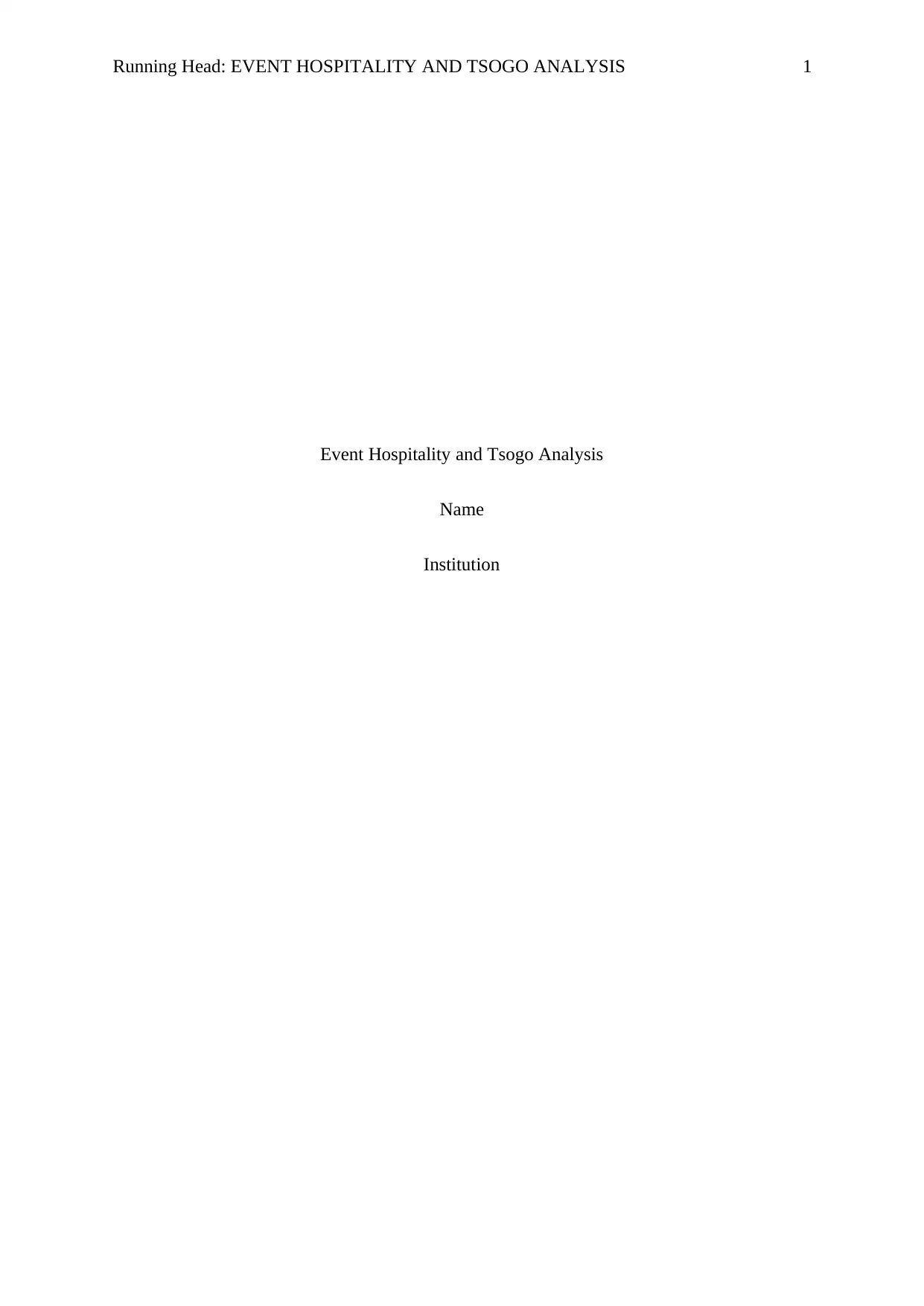
Running Head: EVENT HOSPITALITY AND TSOGO ANALYSIS 1
Event Hospitality and Tsogo Analysis
Name
Institution
Event Hospitality and Tsogo Analysis
Name
Institution
Paraphrase This Document
Need a fresh take? Get an instant paraphrase of this document with our AI Paraphraser
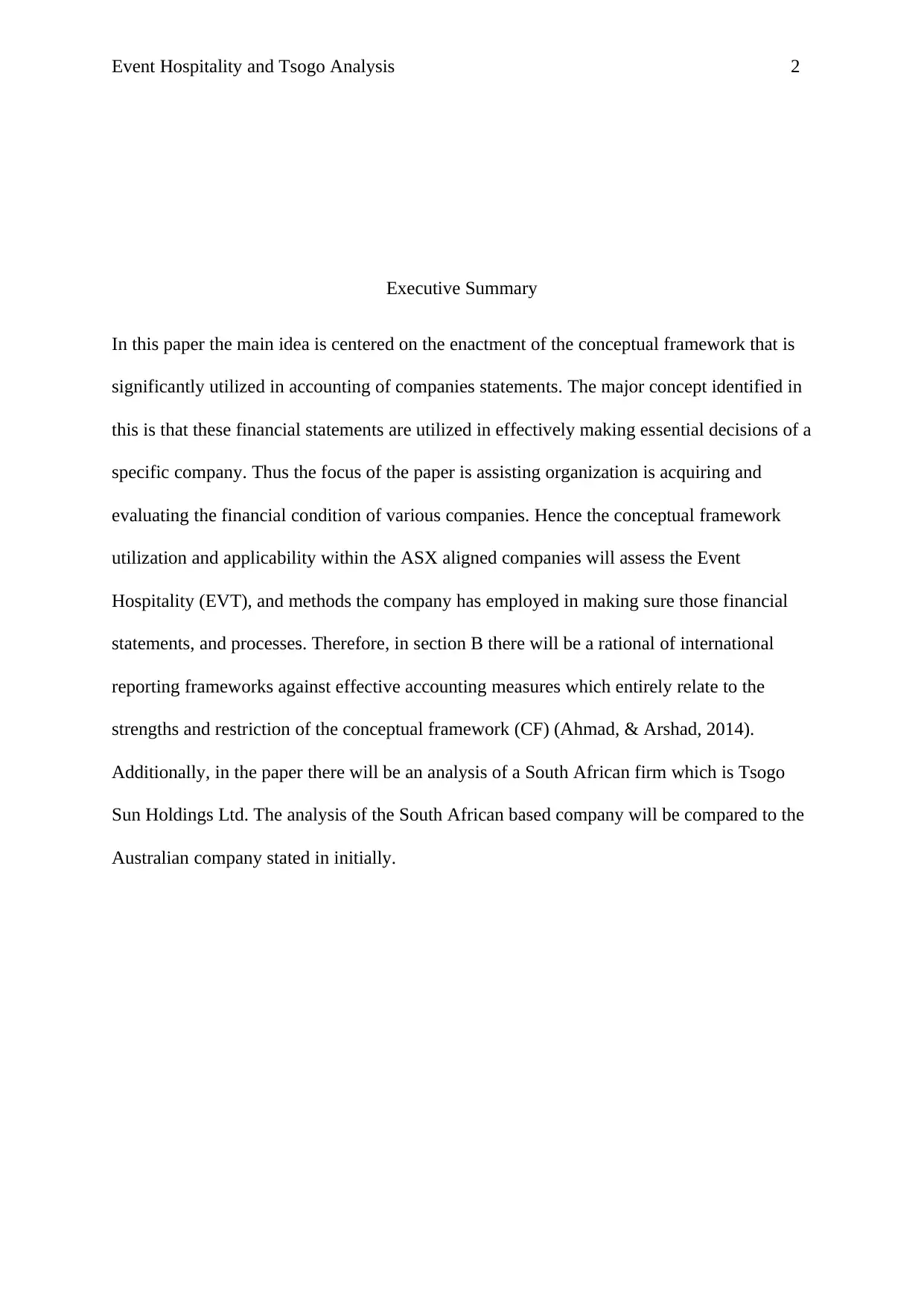
Event Hospitality and Tsogo Analysis 2
Executive Summary
In this paper the main idea is centered on the enactment of the conceptual framework that is
significantly utilized in accounting of companies statements. The major concept identified in
this is that these financial statements are utilized in effectively making essential decisions of a
specific company. Thus the focus of the paper is assisting organization is acquiring and
evaluating the financial condition of various companies. Hence the conceptual framework
utilization and applicability within the ASX aligned companies will assess the Event
Hospitality (EVT), and methods the company has employed in making sure those financial
statements, and processes. Therefore, in section B there will be a rational of international
reporting frameworks against effective accounting measures which entirely relate to the
strengths and restriction of the conceptual framework (CF) (Ahmad, & Arshad, 2014).
Additionally, in the paper there will be an analysis of a South African firm which is Tsogo
Sun Holdings Ltd. The analysis of the South African based company will be compared to the
Australian company stated in initially.
Executive Summary
In this paper the main idea is centered on the enactment of the conceptual framework that is
significantly utilized in accounting of companies statements. The major concept identified in
this is that these financial statements are utilized in effectively making essential decisions of a
specific company. Thus the focus of the paper is assisting organization is acquiring and
evaluating the financial condition of various companies. Hence the conceptual framework
utilization and applicability within the ASX aligned companies will assess the Event
Hospitality (EVT), and methods the company has employed in making sure those financial
statements, and processes. Therefore, in section B there will be a rational of international
reporting frameworks against effective accounting measures which entirely relate to the
strengths and restriction of the conceptual framework (CF) (Ahmad, & Arshad, 2014).
Additionally, in the paper there will be an analysis of a South African firm which is Tsogo
Sun Holdings Ltd. The analysis of the South African based company will be compared to the
Australian company stated in initially.
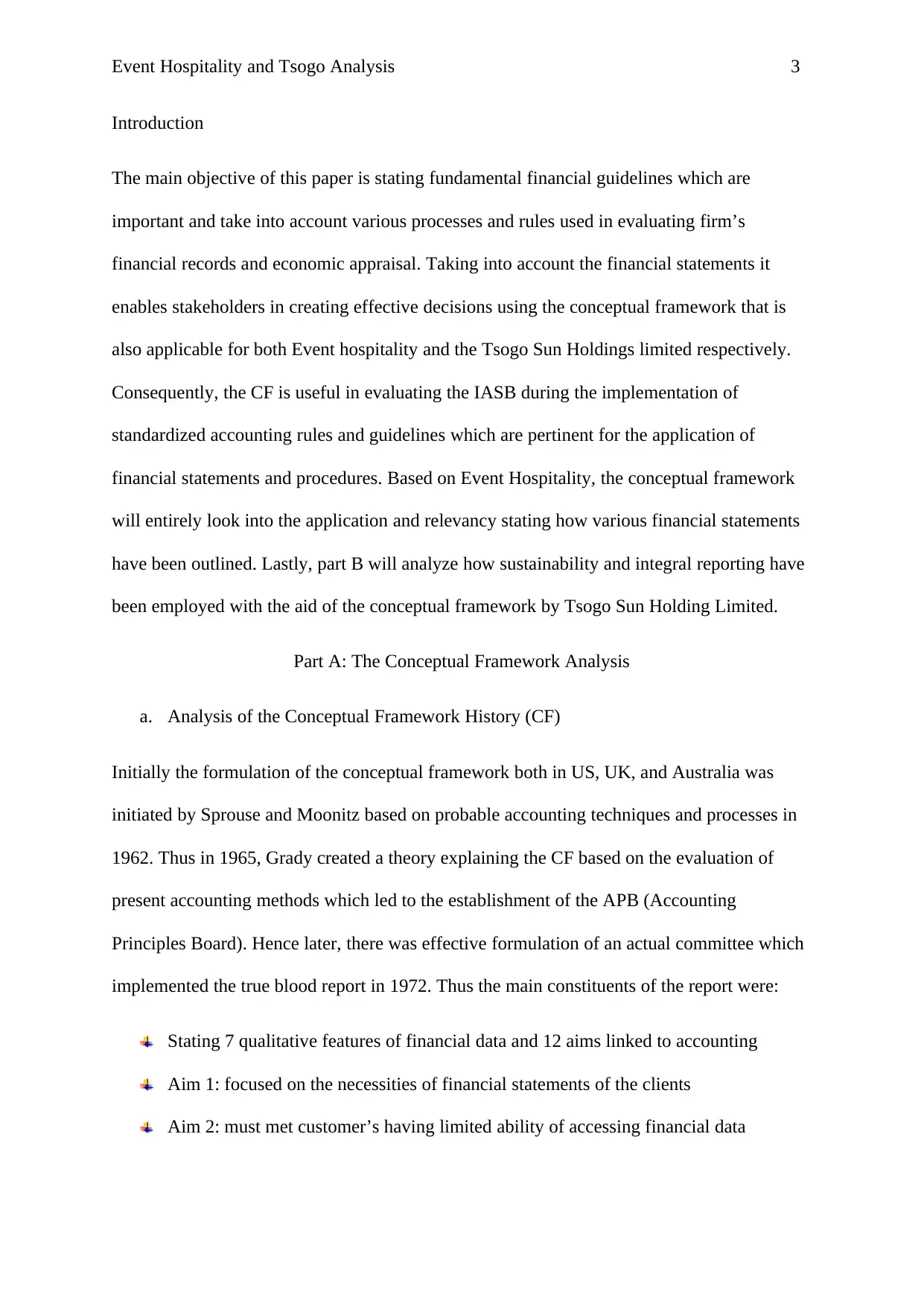
Event Hospitality and Tsogo Analysis 3
Introduction
The main objective of this paper is stating fundamental financial guidelines which are
important and take into account various processes and rules used in evaluating firm’s
financial records and economic appraisal. Taking into account the financial statements it
enables stakeholders in creating effective decisions using the conceptual framework that is
also applicable for both Event hospitality and the Tsogo Sun Holdings limited respectively.
Consequently, the CF is useful in evaluating the IASB during the implementation of
standardized accounting rules and guidelines which are pertinent for the application of
financial statements and procedures. Based on Event Hospitality, the conceptual framework
will entirely look into the application and relevancy stating how various financial statements
have been outlined. Lastly, part B will analyze how sustainability and integral reporting have
been employed with the aid of the conceptual framework by Tsogo Sun Holding Limited.
Part A: The Conceptual Framework Analysis
a. Analysis of the Conceptual Framework History (CF)
Initially the formulation of the conceptual framework both in US, UK, and Australia was
initiated by Sprouse and Moonitz based on probable accounting techniques and processes in
1962. Thus in 1965, Grady created a theory explaining the CF based on the evaluation of
present accounting methods which led to the establishment of the APB (Accounting
Principles Board). Hence later, there was effective formulation of an actual committee which
implemented the true blood report in 1972. Thus the main constituents of the report were:
Stating 7 qualitative features of financial data and 12 aims linked to accounting
Aim 1: focused on the necessities of financial statements of the clients
Aim 2: must met customer’s having limited ability of accessing financial data
Introduction
The main objective of this paper is stating fundamental financial guidelines which are
important and take into account various processes and rules used in evaluating firm’s
financial records and economic appraisal. Taking into account the financial statements it
enables stakeholders in creating effective decisions using the conceptual framework that is
also applicable for both Event hospitality and the Tsogo Sun Holdings limited respectively.
Consequently, the CF is useful in evaluating the IASB during the implementation of
standardized accounting rules and guidelines which are pertinent for the application of
financial statements and procedures. Based on Event Hospitality, the conceptual framework
will entirely look into the application and relevancy stating how various financial statements
have been outlined. Lastly, part B will analyze how sustainability and integral reporting have
been employed with the aid of the conceptual framework by Tsogo Sun Holding Limited.
Part A: The Conceptual Framework Analysis
a. Analysis of the Conceptual Framework History (CF)
Initially the formulation of the conceptual framework both in US, UK, and Australia was
initiated by Sprouse and Moonitz based on probable accounting techniques and processes in
1962. Thus in 1965, Grady created a theory explaining the CF based on the evaluation of
present accounting methods which led to the establishment of the APB (Accounting
Principles Board). Hence later, there was effective formulation of an actual committee which
implemented the true blood report in 1972. Thus the main constituents of the report were:
Stating 7 qualitative features of financial data and 12 aims linked to accounting
Aim 1: focused on the necessities of financial statements of the clients
Aim 2: must met customer’s having limited ability of accessing financial data
⊘ This is a preview!⊘
Do you want full access?
Subscribe today to unlock all pages.

Trusted by 1+ million students worldwide
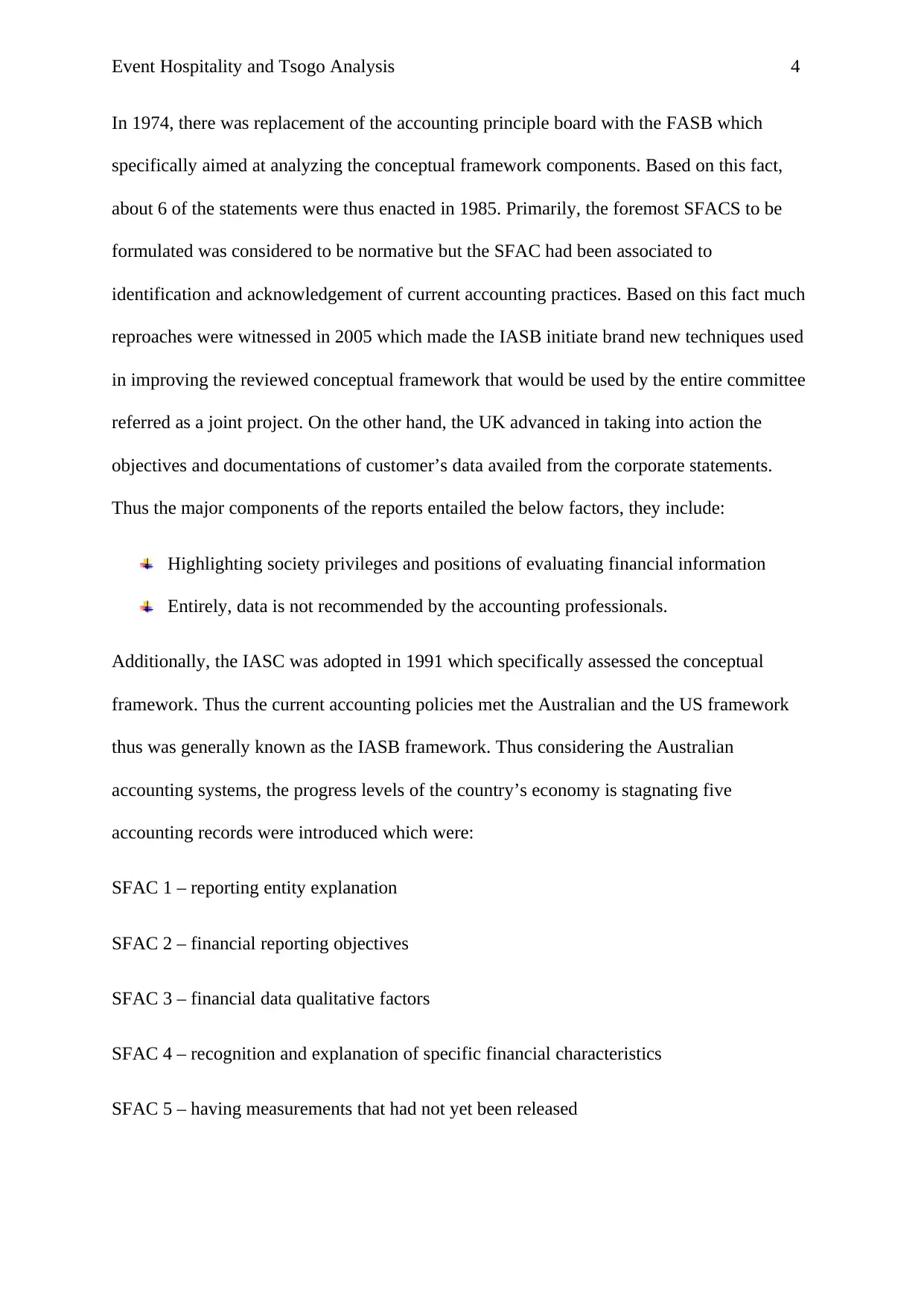
Event Hospitality and Tsogo Analysis 4
In 1974, there was replacement of the accounting principle board with the FASB which
specifically aimed at analyzing the conceptual framework components. Based on this fact,
about 6 of the statements were thus enacted in 1985. Primarily, the foremost SFACS to be
formulated was considered to be normative but the SFAC had been associated to
identification and acknowledgement of current accounting practices. Based on this fact much
reproaches were witnessed in 2005 which made the IASB initiate brand new techniques used
in improving the reviewed conceptual framework that would be used by the entire committee
referred as a joint project. On the other hand, the UK advanced in taking into action the
objectives and documentations of customer’s data availed from the corporate statements.
Thus the major components of the reports entailed the below factors, they include:
Highlighting society privileges and positions of evaluating financial information
Entirely, data is not recommended by the accounting professionals.
Additionally, the IASC was adopted in 1991 which specifically assessed the conceptual
framework. Thus the current accounting policies met the Australian and the US framework
thus was generally known as the IASB framework. Thus considering the Australian
accounting systems, the progress levels of the country’s economy is stagnating five
accounting records were introduced which were:
SFAC 1 – reporting entity explanation
SFAC 2 – financial reporting objectives
SFAC 3 – financial data qualitative factors
SFAC 4 – recognition and explanation of specific financial characteristics
SFAC 5 – having measurements that had not yet been released
In 1974, there was replacement of the accounting principle board with the FASB which
specifically aimed at analyzing the conceptual framework components. Based on this fact,
about 6 of the statements were thus enacted in 1985. Primarily, the foremost SFACS to be
formulated was considered to be normative but the SFAC had been associated to
identification and acknowledgement of current accounting practices. Based on this fact much
reproaches were witnessed in 2005 which made the IASB initiate brand new techniques used
in improving the reviewed conceptual framework that would be used by the entire committee
referred as a joint project. On the other hand, the UK advanced in taking into action the
objectives and documentations of customer’s data availed from the corporate statements.
Thus the major components of the reports entailed the below factors, they include:
Highlighting society privileges and positions of evaluating financial information
Entirely, data is not recommended by the accounting professionals.
Additionally, the IASC was adopted in 1991 which specifically assessed the conceptual
framework. Thus the current accounting policies met the Australian and the US framework
thus was generally known as the IASB framework. Thus considering the Australian
accounting systems, the progress levels of the country’s economy is stagnating five
accounting records were introduced which were:
SFAC 1 – reporting entity explanation
SFAC 2 – financial reporting objectives
SFAC 3 – financial data qualitative factors
SFAC 4 – recognition and explanation of specific financial characteristics
SFAC 5 – having measurements that had not yet been released
Paraphrase This Document
Need a fresh take? Get an instant paraphrase of this document with our AI Paraphraser
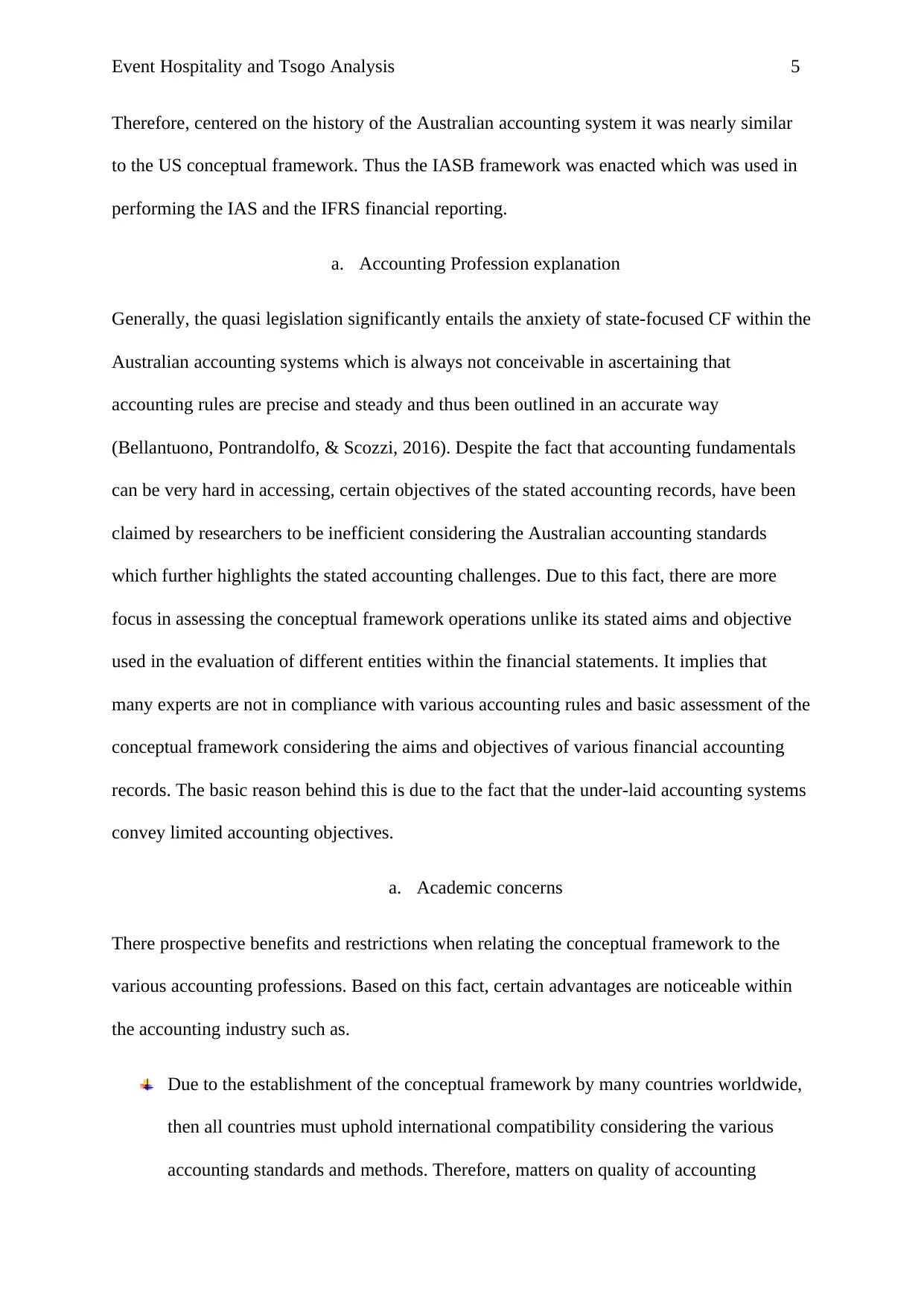
Event Hospitality and Tsogo Analysis 5
Therefore, centered on the history of the Australian accounting system it was nearly similar
to the US conceptual framework. Thus the IASB framework was enacted which was used in
performing the IAS and the IFRS financial reporting.
a. Accounting Profession explanation
Generally, the quasi legislation significantly entails the anxiety of state-focused CF within the
Australian accounting systems which is always not conceivable in ascertaining that
accounting rules are precise and steady and thus been outlined in an accurate way
(Bellantuono, Pontrandolfo, & Scozzi, 2016). Despite the fact that accounting fundamentals
can be very hard in accessing, certain objectives of the stated accounting records, have been
claimed by researchers to be inefficient considering the Australian accounting standards
which further highlights the stated accounting challenges. Due to this fact, there are more
focus in assessing the conceptual framework operations unlike its stated aims and objective
used in the evaluation of different entities within the financial statements. It implies that
many experts are not in compliance with various accounting rules and basic assessment of the
conceptual framework considering the aims and objectives of various financial accounting
records. The basic reason behind this is due to the fact that the under-laid accounting systems
convey limited accounting objectives.
a. Academic concerns
There prospective benefits and restrictions when relating the conceptual framework to the
various accounting professions. Based on this fact, certain advantages are noticeable within
the accounting industry such as.
Due to the establishment of the conceptual framework by many countries worldwide,
then all countries must uphold international compatibility considering the various
accounting standards and methods. Therefore, matters on quality of accounting
Therefore, centered on the history of the Australian accounting system it was nearly similar
to the US conceptual framework. Thus the IASB framework was enacted which was used in
performing the IAS and the IFRS financial reporting.
a. Accounting Profession explanation
Generally, the quasi legislation significantly entails the anxiety of state-focused CF within the
Australian accounting systems which is always not conceivable in ascertaining that
accounting rules are precise and steady and thus been outlined in an accurate way
(Bellantuono, Pontrandolfo, & Scozzi, 2016). Despite the fact that accounting fundamentals
can be very hard in accessing, certain objectives of the stated accounting records, have been
claimed by researchers to be inefficient considering the Australian accounting standards
which further highlights the stated accounting challenges. Due to this fact, there are more
focus in assessing the conceptual framework operations unlike its stated aims and objective
used in the evaluation of different entities within the financial statements. It implies that
many experts are not in compliance with various accounting rules and basic assessment of the
conceptual framework considering the aims and objectives of various financial accounting
records. The basic reason behind this is due to the fact that the under-laid accounting systems
convey limited accounting objectives.
a. Academic concerns
There prospective benefits and restrictions when relating the conceptual framework to the
various accounting professions. Based on this fact, certain advantages are noticeable within
the accounting industry such as.
Due to the establishment of the conceptual framework by many countries worldwide,
then all countries must uphold international compatibility considering the various
accounting standards and methods. Therefore, matters on quality of accounting
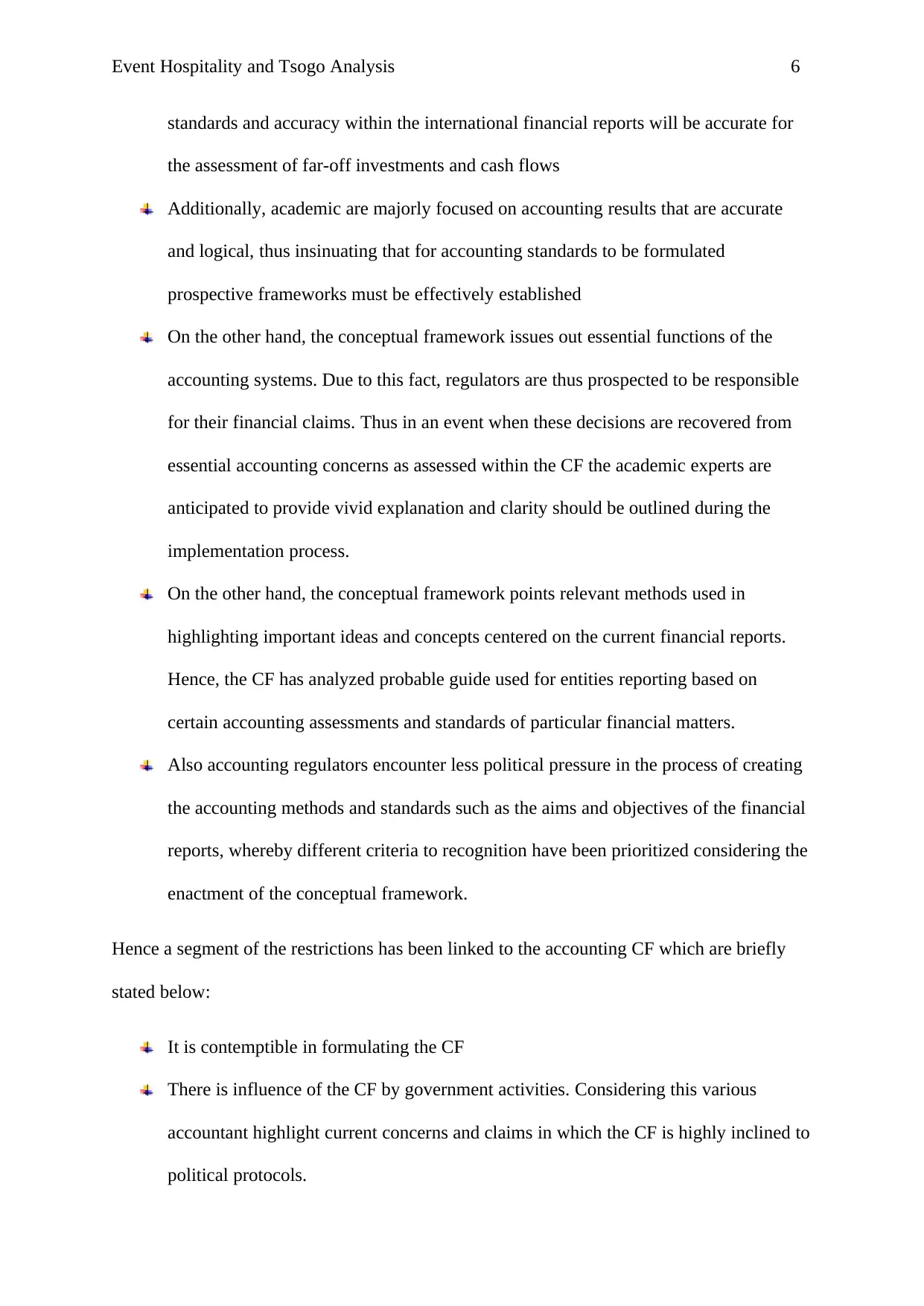
Event Hospitality and Tsogo Analysis 6
standards and accuracy within the international financial reports will be accurate for
the assessment of far-off investments and cash flows
Additionally, academic are majorly focused on accounting results that are accurate
and logical, thus insinuating that for accounting standards to be formulated
prospective frameworks must be effectively established
On the other hand, the conceptual framework issues out essential functions of the
accounting systems. Due to this fact, regulators are thus prospected to be responsible
for their financial claims. Thus in an event when these decisions are recovered from
essential accounting concerns as assessed within the CF the academic experts are
anticipated to provide vivid explanation and clarity should be outlined during the
implementation process.
On the other hand, the conceptual framework points relevant methods used in
highlighting important ideas and concepts centered on the current financial reports.
Hence, the CF has analyzed probable guide used for entities reporting based on
certain accounting assessments and standards of particular financial matters.
Also accounting regulators encounter less political pressure in the process of creating
the accounting methods and standards such as the aims and objectives of the financial
reports, whereby different criteria to recognition have been prioritized considering the
enactment of the conceptual framework.
Hence a segment of the restrictions has been linked to the accounting CF which are briefly
stated below:
It is contemptible in formulating the CF
There is influence of the CF by government activities. Considering this various
accountant highlight current concerns and claims in which the CF is highly inclined to
political protocols.
standards and accuracy within the international financial reports will be accurate for
the assessment of far-off investments and cash flows
Additionally, academic are majorly focused on accounting results that are accurate
and logical, thus insinuating that for accounting standards to be formulated
prospective frameworks must be effectively established
On the other hand, the conceptual framework issues out essential functions of the
accounting systems. Due to this fact, regulators are thus prospected to be responsible
for their financial claims. Thus in an event when these decisions are recovered from
essential accounting concerns as assessed within the CF the academic experts are
anticipated to provide vivid explanation and clarity should be outlined during the
implementation process.
On the other hand, the conceptual framework points relevant methods used in
highlighting important ideas and concepts centered on the current financial reports.
Hence, the CF has analyzed probable guide used for entities reporting based on
certain accounting assessments and standards of particular financial matters.
Also accounting regulators encounter less political pressure in the process of creating
the accounting methods and standards such as the aims and objectives of the financial
reports, whereby different criteria to recognition have been prioritized considering the
enactment of the conceptual framework.
Hence a segment of the restrictions has been linked to the accounting CF which are briefly
stated below:
It is contemptible in formulating the CF
There is influence of the CF by government activities. Considering this various
accountant highlight current concerns and claims in which the CF is highly inclined to
political protocols.
⊘ This is a preview!⊘
Do you want full access?
Subscribe today to unlock all pages.

Trusted by 1+ million students worldwide
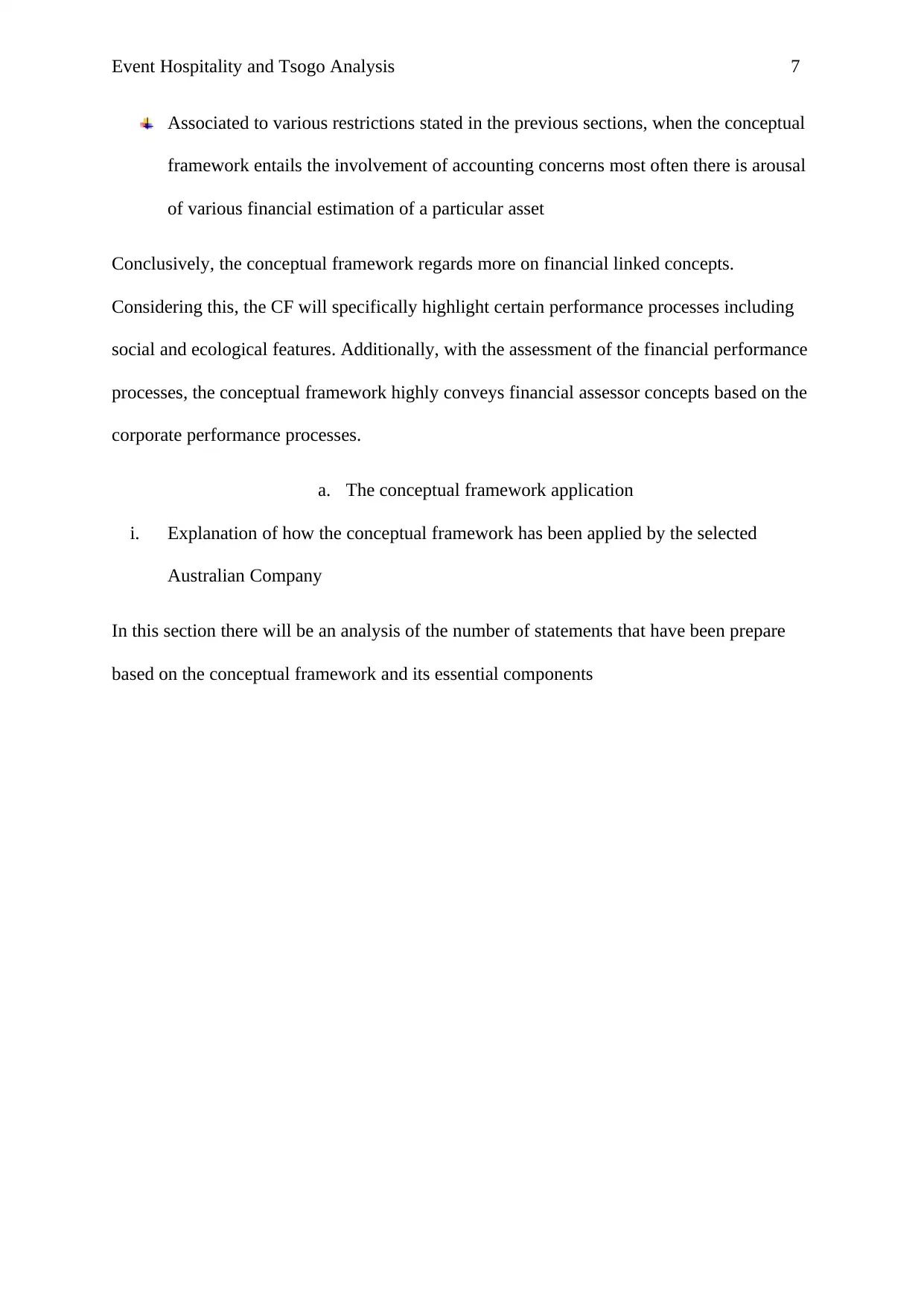
Event Hospitality and Tsogo Analysis 7
Associated to various restrictions stated in the previous sections, when the conceptual
framework entails the involvement of accounting concerns most often there is arousal
of various financial estimation of a particular asset
Conclusively, the conceptual framework regards more on financial linked concepts.
Considering this, the CF will specifically highlight certain performance processes including
social and ecological features. Additionally, with the assessment of the financial performance
processes, the conceptual framework highly conveys financial assessor concepts based on the
corporate performance processes.
a. The conceptual framework application
i. Explanation of how the conceptual framework has been applied by the selected
Australian Company
In this section there will be an analysis of the number of statements that have been prepare
based on the conceptual framework and its essential components
Associated to various restrictions stated in the previous sections, when the conceptual
framework entails the involvement of accounting concerns most often there is arousal
of various financial estimation of a particular asset
Conclusively, the conceptual framework regards more on financial linked concepts.
Considering this, the CF will specifically highlight certain performance processes including
social and ecological features. Additionally, with the assessment of the financial performance
processes, the conceptual framework highly conveys financial assessor concepts based on the
corporate performance processes.
a. The conceptual framework application
i. Explanation of how the conceptual framework has been applied by the selected
Australian Company
In this section there will be an analysis of the number of statements that have been prepare
based on the conceptual framework and its essential components
Paraphrase This Document
Need a fresh take? Get an instant paraphrase of this document with our AI Paraphraser
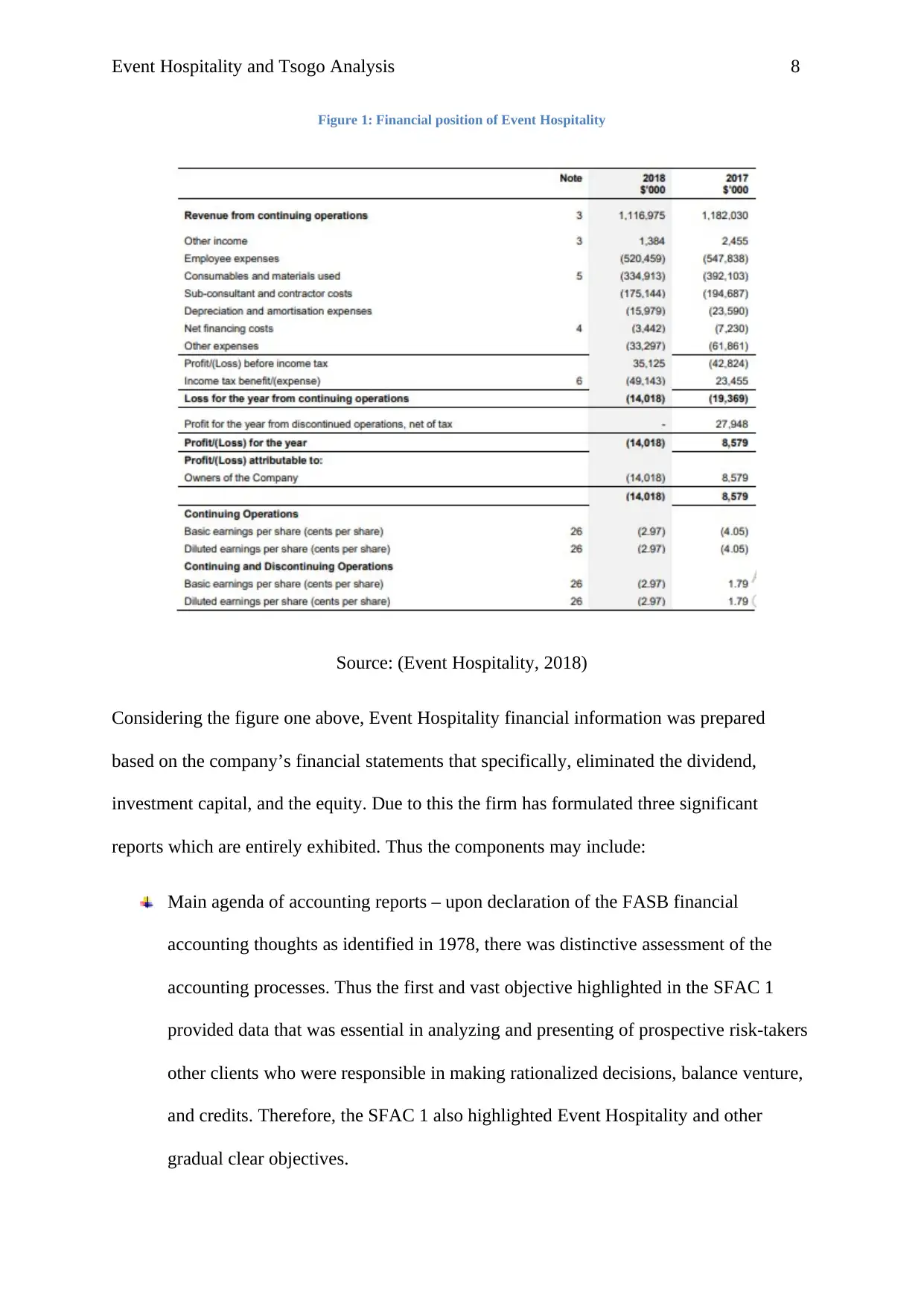
Event Hospitality and Tsogo Analysis 8
Figure 1: Financial position of Event Hospitality
Source: (Event Hospitality, 2018)
Considering the figure one above, Event Hospitality financial information was prepared
based on the company’s financial statements that specifically, eliminated the dividend,
investment capital, and the equity. Due to this the firm has formulated three significant
reports which are entirely exhibited. Thus the components may include:
Main agenda of accounting reports – upon declaration of the FASB financial
accounting thoughts as identified in 1978, there was distinctive assessment of the
accounting processes. Thus the first and vast objective highlighted in the SFAC 1
provided data that was essential in analyzing and presenting of prospective risk-takers
other clients who were responsible in making rationalized decisions, balance venture,
and credits. Therefore, the SFAC 1 also highlighted Event Hospitality and other
gradual clear objectives.
Figure 1: Financial position of Event Hospitality
Source: (Event Hospitality, 2018)
Considering the figure one above, Event Hospitality financial information was prepared
based on the company’s financial statements that specifically, eliminated the dividend,
investment capital, and the equity. Due to this the firm has formulated three significant
reports which are entirely exhibited. Thus the components may include:
Main agenda of accounting reports – upon declaration of the FASB financial
accounting thoughts as identified in 1978, there was distinctive assessment of the
accounting processes. Thus the first and vast objective highlighted in the SFAC 1
provided data that was essential in analyzing and presenting of prospective risk-takers
other clients who were responsible in making rationalized decisions, balance venture,
and credits. Therefore, the SFAC 1 also highlighted Event Hospitality and other
gradual clear objectives.
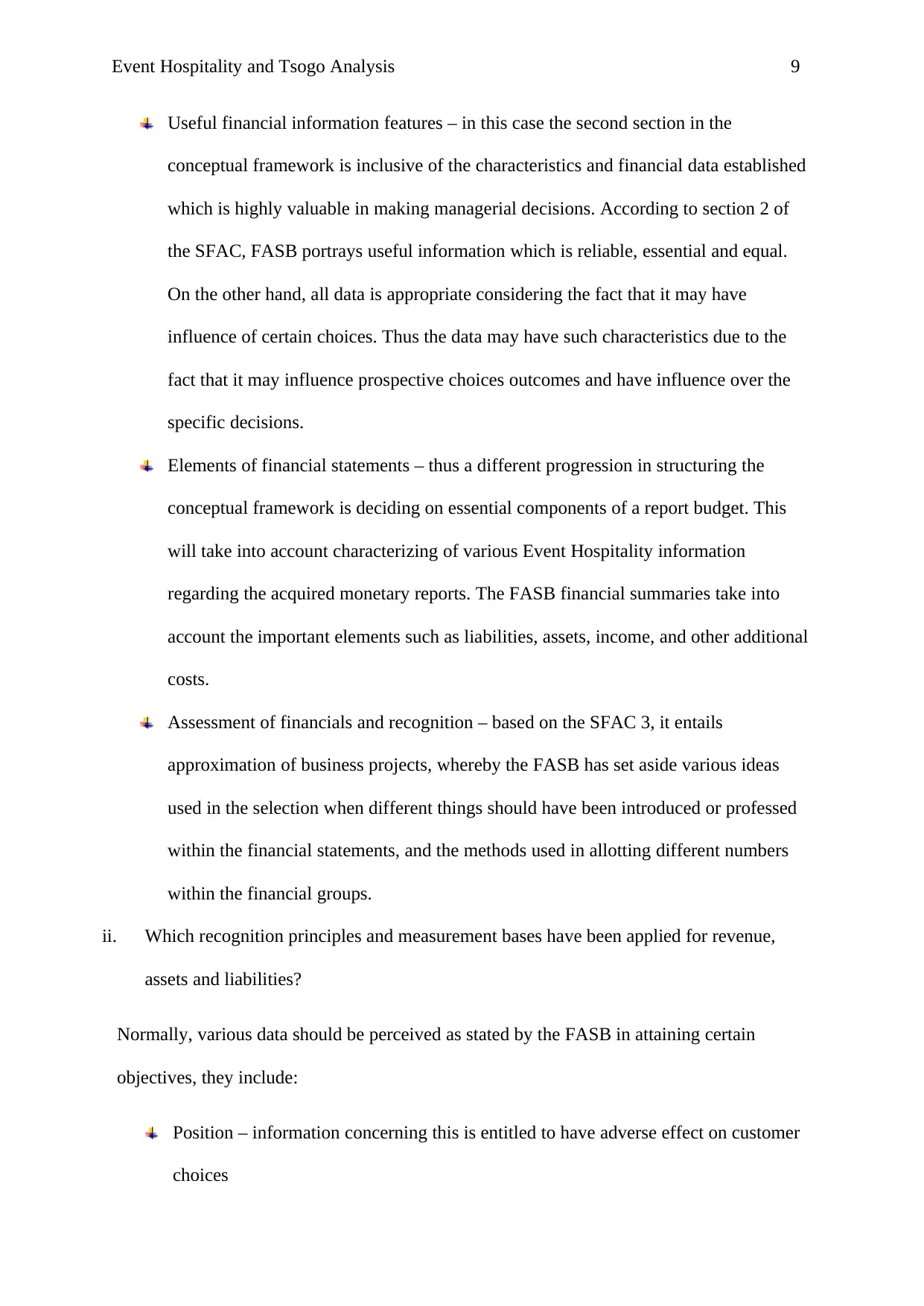
Event Hospitality and Tsogo Analysis 9
Useful financial information features – in this case the second section in the
conceptual framework is inclusive of the characteristics and financial data established
which is highly valuable in making managerial decisions. According to section 2 of
the SFAC, FASB portrays useful information which is reliable, essential and equal.
On the other hand, all data is appropriate considering the fact that it may have
influence of certain choices. Thus the data may have such characteristics due to the
fact that it may influence prospective choices outcomes and have influence over the
specific decisions.
Elements of financial statements – thus a different progression in structuring the
conceptual framework is deciding on essential components of a report budget. This
will take into account characterizing of various Event Hospitality information
regarding the acquired monetary reports. The FASB financial summaries take into
account the important elements such as liabilities, assets, income, and other additional
costs.
Assessment of financials and recognition – based on the SFAC 3, it entails
approximation of business projects, whereby the FASB has set aside various ideas
used in the selection when different things should have been introduced or professed
within the financial statements, and the methods used in allotting different numbers
within the financial groups.
ii. Which recognition principles and measurement bases have been applied for revenue,
assets and liabilities?
Normally, various data should be perceived as stated by the FASB in attaining certain
objectives, they include:
Position – information concerning this is entitled to have adverse effect on customer
choices
Useful financial information features – in this case the second section in the
conceptual framework is inclusive of the characteristics and financial data established
which is highly valuable in making managerial decisions. According to section 2 of
the SFAC, FASB portrays useful information which is reliable, essential and equal.
On the other hand, all data is appropriate considering the fact that it may have
influence of certain choices. Thus the data may have such characteristics due to the
fact that it may influence prospective choices outcomes and have influence over the
specific decisions.
Elements of financial statements – thus a different progression in structuring the
conceptual framework is deciding on essential components of a report budget. This
will take into account characterizing of various Event Hospitality information
regarding the acquired monetary reports. The FASB financial summaries take into
account the important elements such as liabilities, assets, income, and other additional
costs.
Assessment of financials and recognition – based on the SFAC 3, it entails
approximation of business projects, whereby the FASB has set aside various ideas
used in the selection when different things should have been introduced or professed
within the financial statements, and the methods used in allotting different numbers
within the financial groups.
ii. Which recognition principles and measurement bases have been applied for revenue,
assets and liabilities?
Normally, various data should be perceived as stated by the FASB in attaining certain
objectives, they include:
Position – information concerning this is entitled to have adverse effect on customer
choices
⊘ This is a preview!⊘
Do you want full access?
Subscribe today to unlock all pages.

Trusted by 1+ million students worldwide
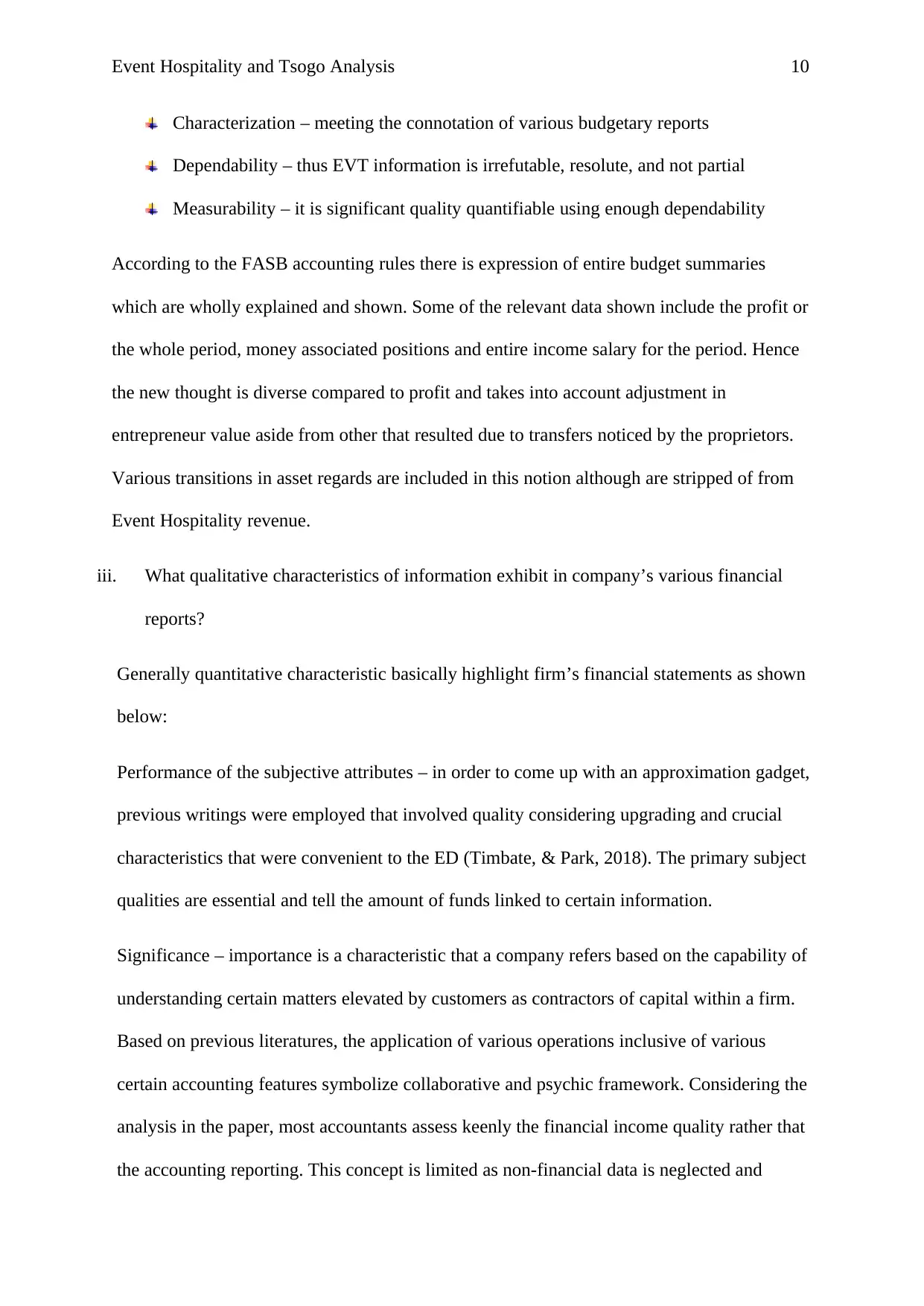
Event Hospitality and Tsogo Analysis 10
Characterization – meeting the connotation of various budgetary reports
Dependability – thus EVT information is irrefutable, resolute, and not partial
Measurability – it is significant quality quantifiable using enough dependability
According to the FASB accounting rules there is expression of entire budget summaries
which are wholly explained and shown. Some of the relevant data shown include the profit or
the whole period, money associated positions and entire income salary for the period. Hence
the new thought is diverse compared to profit and takes into account adjustment in
entrepreneur value aside from other that resulted due to transfers noticed by the proprietors.
Various transitions in asset regards are included in this notion although are stripped of from
Event Hospitality revenue.
iii. What qualitative characteristics of information exhibit in company’s various financial
reports?
Generally quantitative characteristic basically highlight firm’s financial statements as shown
below:
Performance of the subjective attributes – in order to come up with an approximation gadget,
previous writings were employed that involved quality considering upgrading and crucial
characteristics that were convenient to the ED (Timbate, & Park, 2018). The primary subject
qualities are essential and tell the amount of funds linked to certain information.
Significance – importance is a characteristic that a company refers based on the capability of
understanding certain matters elevated by customers as contractors of capital within a firm.
Based on previous literatures, the application of various operations inclusive of various
certain accounting features symbolize collaborative and psychic framework. Considering the
analysis in the paper, most accountants assess keenly the financial income quality rather that
the accounting reporting. This concept is limited as non-financial data is neglected and
Characterization – meeting the connotation of various budgetary reports
Dependability – thus EVT information is irrefutable, resolute, and not partial
Measurability – it is significant quality quantifiable using enough dependability
According to the FASB accounting rules there is expression of entire budget summaries
which are wholly explained and shown. Some of the relevant data shown include the profit or
the whole period, money associated positions and entire income salary for the period. Hence
the new thought is diverse compared to profit and takes into account adjustment in
entrepreneur value aside from other that resulted due to transfers noticed by the proprietors.
Various transitions in asset regards are included in this notion although are stripped of from
Event Hospitality revenue.
iii. What qualitative characteristics of information exhibit in company’s various financial
reports?
Generally quantitative characteristic basically highlight firm’s financial statements as shown
below:
Performance of the subjective attributes – in order to come up with an approximation gadget,
previous writings were employed that involved quality considering upgrading and crucial
characteristics that were convenient to the ED (Timbate, & Park, 2018). The primary subject
qualities are essential and tell the amount of funds linked to certain information.
Significance – importance is a characteristic that a company refers based on the capability of
understanding certain matters elevated by customers as contractors of capital within a firm.
Based on previous literatures, the application of various operations inclusive of various
certain accounting features symbolize collaborative and psychic framework. Considering the
analysis in the paper, most accountants assess keenly the financial income quality rather that
the accounting reporting. This concept is limited as non-financial data is neglected and
Paraphrase This Document
Need a fresh take? Get an instant paraphrase of this document with our AI Paraphraser
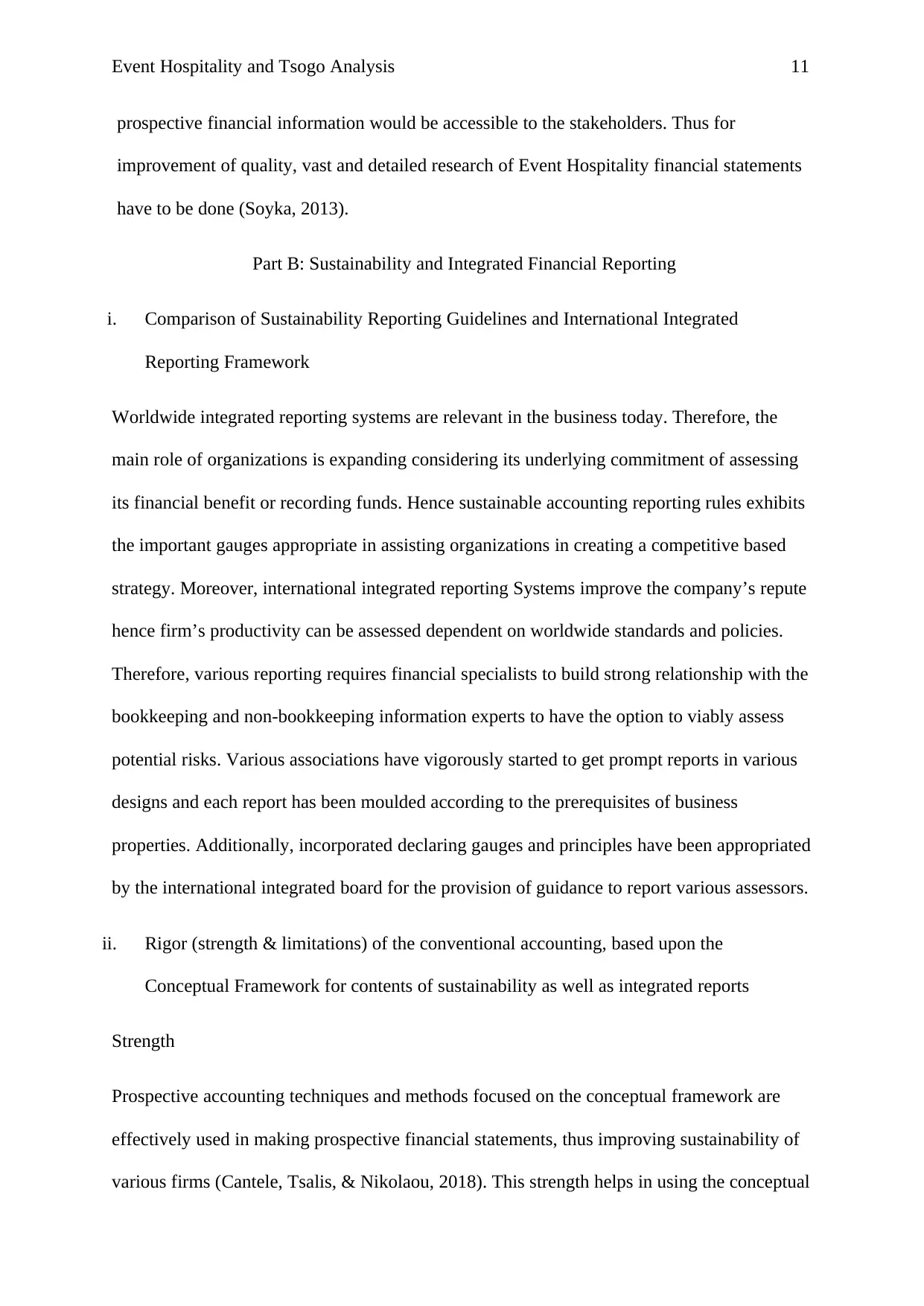
Event Hospitality and Tsogo Analysis 11
prospective financial information would be accessible to the stakeholders. Thus for
improvement of quality, vast and detailed research of Event Hospitality financial statements
have to be done (Soyka, 2013).
Part B: Sustainability and Integrated Financial Reporting
i. Comparison of Sustainability Reporting Guidelines and International Integrated
Reporting Framework
Worldwide integrated reporting systems are relevant in the business today. Therefore, the
main role of organizations is expanding considering its underlying commitment of assessing
its financial benefit or recording funds. Hence sustainable accounting reporting rules exhibits
the important gauges appropriate in assisting organizations in creating a competitive based
strategy. Moreover, international integrated reporting Systems improve the company’s repute
hence firm’s productivity can be assessed dependent on worldwide standards and policies.
Therefore, various reporting requires financial specialists to build strong relationship with the
bookkeeping and non-bookkeeping information experts to have the option to viably assess
potential risks. Various associations have vigorously started to get prompt reports in various
designs and each report has been moulded according to the prerequisites of business
properties. Additionally, incorporated declaring gauges and principles have been appropriated
by the international integrated board for the provision of guidance to report various assessors.
ii. Rigor (strength & limitations) of the conventional accounting, based upon the
Conceptual Framework for contents of sustainability as well as integrated reports
Strength
Prospective accounting techniques and methods focused on the conceptual framework are
effectively used in making prospective financial statements, thus improving sustainability of
various firms (Cantele, Tsalis, & Nikolaou, 2018). This strength helps in using the conceptual
prospective financial information would be accessible to the stakeholders. Thus for
improvement of quality, vast and detailed research of Event Hospitality financial statements
have to be done (Soyka, 2013).
Part B: Sustainability and Integrated Financial Reporting
i. Comparison of Sustainability Reporting Guidelines and International Integrated
Reporting Framework
Worldwide integrated reporting systems are relevant in the business today. Therefore, the
main role of organizations is expanding considering its underlying commitment of assessing
its financial benefit or recording funds. Hence sustainable accounting reporting rules exhibits
the important gauges appropriate in assisting organizations in creating a competitive based
strategy. Moreover, international integrated reporting Systems improve the company’s repute
hence firm’s productivity can be assessed dependent on worldwide standards and policies.
Therefore, various reporting requires financial specialists to build strong relationship with the
bookkeeping and non-bookkeeping information experts to have the option to viably assess
potential risks. Various associations have vigorously started to get prompt reports in various
designs and each report has been moulded according to the prerequisites of business
properties. Additionally, incorporated declaring gauges and principles have been appropriated
by the international integrated board for the provision of guidance to report various assessors.
ii. Rigor (strength & limitations) of the conventional accounting, based upon the
Conceptual Framework for contents of sustainability as well as integrated reports
Strength
Prospective accounting techniques and methods focused on the conceptual framework are
effectively used in making prospective financial statements, thus improving sustainability of
various firms (Cantele, Tsalis, & Nikolaou, 2018). This strength helps in using the conceptual
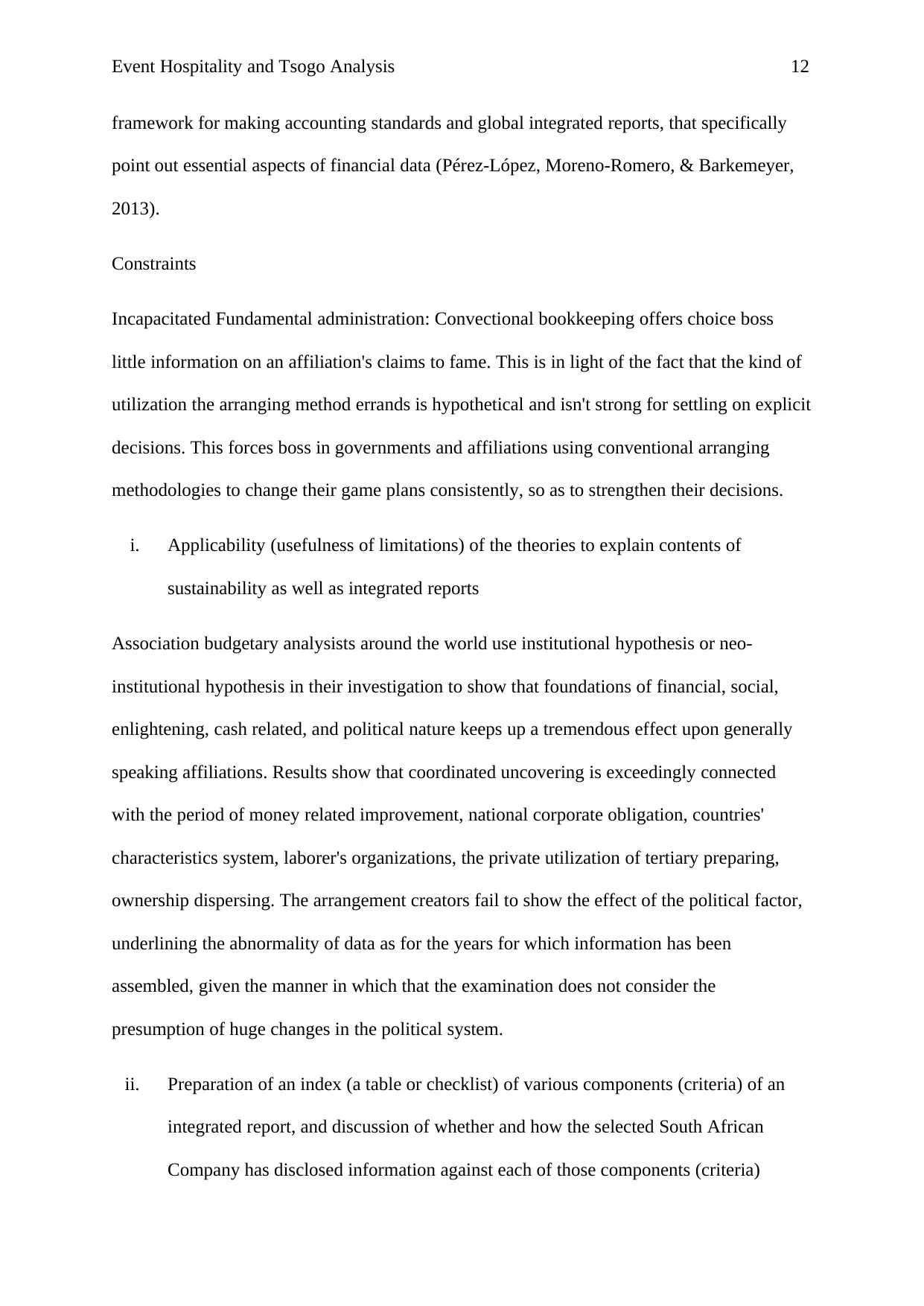
Event Hospitality and Tsogo Analysis 12
framework for making accounting standards and global integrated reports, that specifically
point out essential aspects of financial data (Pérez-López, Moreno-Romero, & Barkemeyer,
2013).
Constraints
Incapacitated Fundamental administration: Convectional bookkeeping offers choice boss
little information on an affiliation's claims to fame. This is in light of the fact that the kind of
utilization the arranging method errands is hypothetical and isn't strong for settling on explicit
decisions. This forces boss in governments and affiliations using conventional arranging
methodologies to change their game plans consistently, so as to strengthen their decisions.
i. Applicability (usefulness of limitations) of the theories to explain contents of
sustainability as well as integrated reports
Association budgetary analysists around the world use institutional hypothesis or neo-
institutional hypothesis in their investigation to show that foundations of financial, social,
enlightening, cash related, and political nature keeps up a tremendous effect upon generally
speaking affiliations. Results show that coordinated uncovering is exceedingly connected
with the period of money related improvement, national corporate obligation, countries'
characteristics system, laborer's organizations, the private utilization of tertiary preparing,
ownership dispersing. The arrangement creators fail to show the effect of the political factor,
underlining the abnormality of data as for the years for which information has been
assembled, given the manner in which that the examination does not consider the
presumption of huge changes in the political system.
ii. Preparation of an index (a table or checklist) of various components (criteria) of an
integrated report, and discussion of whether and how the selected South African
Company has disclosed information against each of those components (criteria)
framework for making accounting standards and global integrated reports, that specifically
point out essential aspects of financial data (Pérez-López, Moreno-Romero, & Barkemeyer,
2013).
Constraints
Incapacitated Fundamental administration: Convectional bookkeeping offers choice boss
little information on an affiliation's claims to fame. This is in light of the fact that the kind of
utilization the arranging method errands is hypothetical and isn't strong for settling on explicit
decisions. This forces boss in governments and affiliations using conventional arranging
methodologies to change their game plans consistently, so as to strengthen their decisions.
i. Applicability (usefulness of limitations) of the theories to explain contents of
sustainability as well as integrated reports
Association budgetary analysists around the world use institutional hypothesis or neo-
institutional hypothesis in their investigation to show that foundations of financial, social,
enlightening, cash related, and political nature keeps up a tremendous effect upon generally
speaking affiliations. Results show that coordinated uncovering is exceedingly connected
with the period of money related improvement, national corporate obligation, countries'
characteristics system, laborer's organizations, the private utilization of tertiary preparing,
ownership dispersing. The arrangement creators fail to show the effect of the political factor,
underlining the abnormality of data as for the years for which information has been
assembled, given the manner in which that the examination does not consider the
presumption of huge changes in the political system.
ii. Preparation of an index (a table or checklist) of various components (criteria) of an
integrated report, and discussion of whether and how the selected South African
Company has disclosed information against each of those components (criteria)
⊘ This is a preview!⊘
Do you want full access?
Subscribe today to unlock all pages.

Trusted by 1+ million students worldwide
1 out of 17
Related Documents
Your All-in-One AI-Powered Toolkit for Academic Success.
+13062052269
info@desklib.com
Available 24*7 on WhatsApp / Email
![[object Object]](/_next/static/media/star-bottom.7253800d.svg)
Unlock your academic potential
Copyright © 2020–2026 A2Z Services. All Rights Reserved. Developed and managed by ZUCOL.




